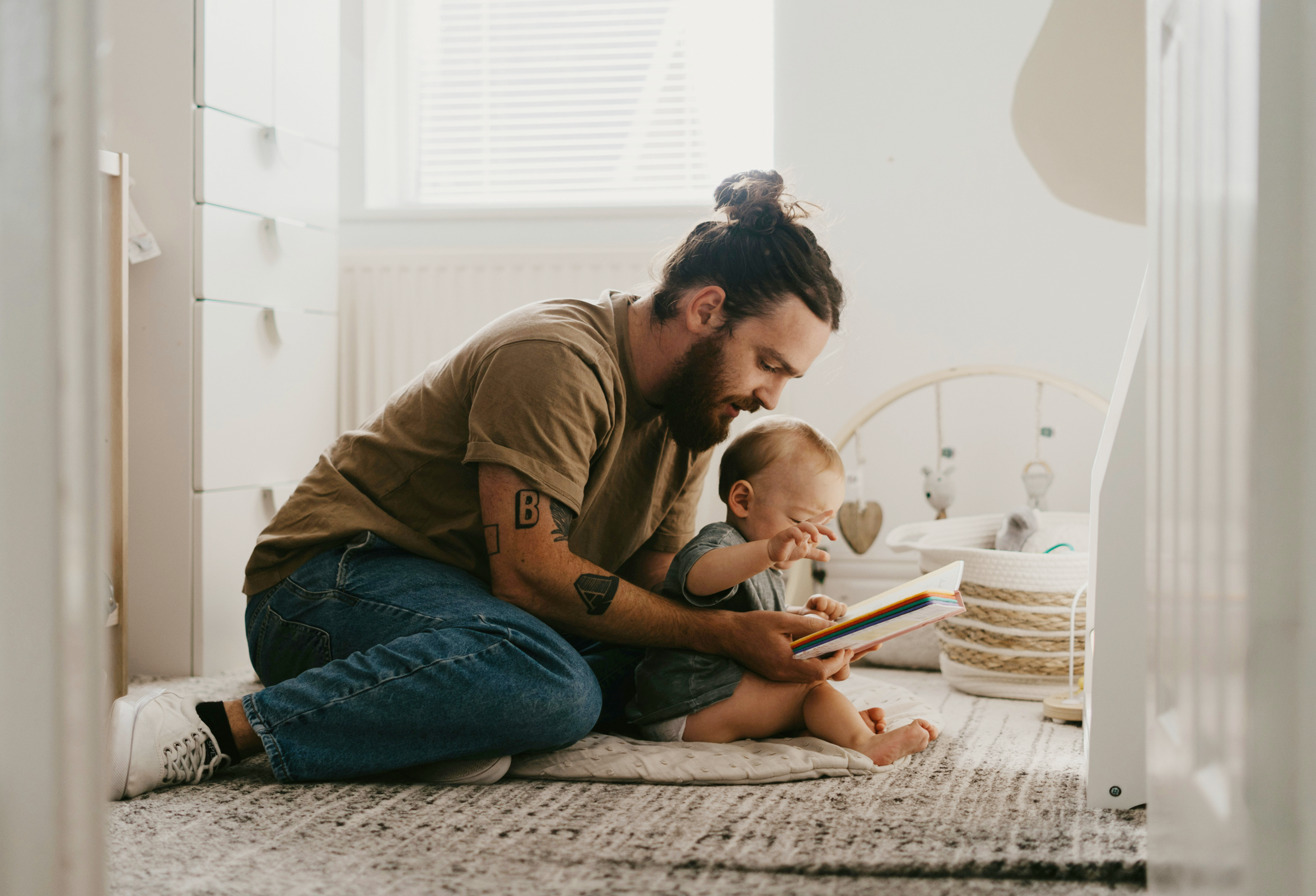Behind the Brave Face: Unmasking Postpartum Depression in Dads
By Jamie Sullivan, MSN, PMHNP-BC
3 min read
Bringing home a new baby is a special and exciting experience for parents—there’s so much love, excitement, and hope wrapped up in those early days. It’s such an incredible gift to start building a bond with a new, tiny person. But we can’t forget that despite all that joy, overwhelm can also settle in. The lack of sleep, the (sometimes drastic) changes in routine, and the emotional ups and downs that come with the new set of responsibilities can be a lot to adjust to in a short time. This is where postpartum depression (PPD) can quietly begin to take hold.
Postpartum depression is more commonly talked about in moms, but what many people don’t realize is that dads can experience it too. In fact, about 1 in 10 fathers go through some form of mood disorder after welcoming a baby,¹ and if their partner is also struggling with postpartum depression, this can increase chances to 50%. This is why it’s important to understand how PPD can show up in dads and how getting the right support can make a real difference.
What Postpartum Depression Can Look Like in Dads
Symptoms of PPD in Men
We often think of depression as feeling excessively sad or crying a lot, but in men, depression can look a little different. Some dads might seem distant or emotionally checked out. Others may feel more irritable, frustrated, or angrier than usual. They may also try to seek out activities that increase dopamine (the feel-good chemical) in their bodies, which can lead to an increased use of alcohol or drugs, long hours spent gaming, gambling, or binge eating. These behaviors aren’t always recognized as signs of depression, but they can be ways of coping with intense feelings or trying to feel some sense of control or relief.
Unlike moms, dads don’t go through hormonal shifts after childbirth, but that doesn’t mean that they’re not deeply impacted. Dads can feel a loss of connection with their partner once the baby arrives, or they might feel isolated as the focus shifts heavily toward the mom and baby. They may also have a hard time bonding with their newborn right away and carry guilt or shame because of it.
The Stigma Around Mental Health for Men
We’ve come a long way when it comes to metal health for men, but unfortunately, there’s still a stigma that men face when they try expressing their emotional pain. Many men are raised to believe they need to be strong, stoic, and keep their struggles to themselves. Because of this, postpartum depression in dads is often underreported or goes unnoticed.
But ignoring how someone feels doesn't make the pain go away and can often make it worse. Reaching out for support is one of the most important steps dads can take for themselves and their family.
The Impact of Postpartum Depression in Dads
It’s common for both partners to feel like their relationship has shifted after the baby arrives. The routines, roles, and rhythms they were used to may feel completely different, and they might not spend as much time together as they once did. There could also be disagreements on how to take care of the baby.
These changes, although completely normal, can feel really hard in the moment. Having open, honest conversations with the other parent can help. Even short moments of connection can go a long way. It may even be helpful to consider talk therapy for each individual, or couples counseling to bring both the mom and dad back to the same page.
Getting Additional Help
Many new parents feel like they should be able to handle everything on their own, but they don’t have to. If friends or family offer to help, say yes. They are usually more than happy to help out by watching the baby, cooking meals, doing laundry, and other house work. Every bit of support counts! Help can come in many forms, and sometimes, the most powerful one is simply getting the chance to sleep.
Most new parents don’t expect to get much sleep, especially with a newborn’s unpredictable sleep schedule, but it’s something every parent should pay attention to. It’s important for their health to get an uninterrupted 4-5 stretch of sleep each night, and the best way to do that is by taking shifts. Each partner can watch the baby while the other rests.
If you know a father is still struggling, offer advice and tell them to consider joining a support group just for dads, like those offered by Postpartum Support International. Talking to other men who are going through something similar can be incredibly validating. Individual therapy can also be a huge help for dads dealing with depression. And in some cases, medication may play a role in helping them feel better, faster.
Postpartum depression in dads is real, and it deserves to be talked about with more understanding and compassion. For dads who have recently welcomed a baby and are noticing changes in mood, energy, or connection with their baby or partner, speaking with a psychiatric nurse practitioner can be a great way to understand your feelings while getting the right guidance on coping with PPD.
References
¹ Edward J. O’Connor et al. (2024) Transitioning to fatherhood: Prospective effects of wellbeing on future depression symptoms, Journal of Affective Disorders. Available at: https://www.sciencedirect.com/science/article/abs/pii/S0165032724017889.
All content and information on this website are for informational purposes only. None of the material is intended to be a substitute for professional medical advice, diagnosis, or treatment. This information does not create any client-provider relationship. Please consult with your mental health care provider before making any health care decisions or for guidance about a specific medical condition.


